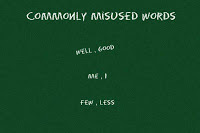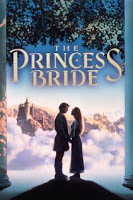Misunderstood Words and a Classic Movie
We all know editing is important. Some of us will admit we take it seriously. I once was asked to double check some paperwork I had completed for my students' standardized testing. This was before we had conveniently printed labels with all the pertinent information. I had already spent three days bubbling in student names, ages, and social security numbers. I really didn't want to go back and check them. Surely I had filled in every bubble correctly. I'm a careful person. I knew how important it was to have the correct information on a student's standardized test.
But I double checked. And found three mistakes. And had a thought that I try to keep in the forefront of my mind when I'm editing—again: "After all, who makes mistakes on purpose?"

I think one hindrance in writing correctly is there are so many words in the English language that sound similar. When we are speaking there is no difference between the word "wood" as it applies to a tree, and the word "would", which is a modal verb, usually the past tense of "will". When a person is speaking the listener automatically knows which word is meant through the context of the sentence. But people who aren't naturally students of the written word might have difficulty remembering which one to use when they are writing. This is another critical aspect of being a writer. If we want our thoughts as written words to be taken seriously, then we must use them correctly.
So, in the hope of helping someone who may not naturally focus on the particulars of writing, I would like to start a list of commonly misused words. Here are my top ten. Feel free to add others you have discovered in the comment section below:

10. Past and Passed
Past is an adjective referring to something no longer existing: Dinosaurs lived in the past.
Passed is a verb meaning "move in a certain direction": He passed me on his scooter yesterday.
9. Accept and Except
Accept is a verb meaning "to receive": Please accept my apology.
Except is usually a preposition meaning "excluding": We will go to all the stores except Target.
8. Affect and Effect
Affect is usually a verb meaning "to influence": The weather will affect our outing.
Effect is usually a verb meaning "to bring about": The effect of my not studying was a bad grade on the test.
7. Than and Then
Than is a conjunction used in comparisons: I am taller than you.
Then is an adverb denoting time: First we will eat, then we will watch the movie.
6. Lie and Lay
Lie is a verb meaning "to rest in a horizontal position". Its principal parts are lie, lay, lain: When I am tired I will lie down.
Lay is a verb meaning "to put or place". Its principal parts are lay and laid: He laid the basket carefully on the table.
5. Their, There, and They're
Their is a possessive adjective indicating belonging: Did you see their new car?
There is an adverb used to indicate position: The book is there, on the table.
They're is the contraction for they are: They're going to be late.
4. Farther and Further (this one I still have to consciously think about)
Farther is an adverb referring to a physical distance: He took two steps farther into the room.
Further is an adverb referring to an extension of time or degree: They could not go any further in the discussion without it becoming an argument.
3. Here and Hear
Here is an adverb referring to location: We are finally here!
Hear is a verb meaning "the ability to recognize sound": Did you hear the beautiful orchestra?
2. Alright and All right
Alright is not a word. You should always use all right. All right?
1. Your and You're
Your is a possessive pronoun: This is your hat.
You're is the contraction for you are: You're going to get wet if you don't use an umbrella.

There are many other sites on the web with examples of misused words and their proper meanings. My personal favorite is The Inigo Montoya Guide to 27 Commonly Misused Words. Anyone who can use a character from "The Princess Bride" to make grammar palatable is my hero!
Happy writing,
Karina Harris
author and educator
www.karinaharrisauthor.com
Lonely Hearts ~ a sweet Christian Romance
The Price of Trust ~ Christian Romantic Suspense
http://www.booksbyamanda.com







But I double checked. And found three mistakes. And had a thought that I try to keep in the forefront of my mind when I'm editing—again: "After all, who makes mistakes on purpose?"

I think one hindrance in writing correctly is there are so many words in the English language that sound similar. When we are speaking there is no difference between the word "wood" as it applies to a tree, and the word "would", which is a modal verb, usually the past tense of "will". When a person is speaking the listener automatically knows which word is meant through the context of the sentence. But people who aren't naturally students of the written word might have difficulty remembering which one to use when they are writing. This is another critical aspect of being a writer. If we want our thoughts as written words to be taken seriously, then we must use them correctly.
So, in the hope of helping someone who may not naturally focus on the particulars of writing, I would like to start a list of commonly misused words. Here are my top ten. Feel free to add others you have discovered in the comment section below:

10. Past and Passed
Past is an adjective referring to something no longer existing: Dinosaurs lived in the past.
Passed is a verb meaning "move in a certain direction": He passed me on his scooter yesterday.
9. Accept and Except
Accept is a verb meaning "to receive": Please accept my apology.
Except is usually a preposition meaning "excluding": We will go to all the stores except Target.
8. Affect and Effect
Affect is usually a verb meaning "to influence": The weather will affect our outing.
Effect is usually a verb meaning "to bring about": The effect of my not studying was a bad grade on the test.
7. Than and Then
Than is a conjunction used in comparisons: I am taller than you.
Then is an adverb denoting time: First we will eat, then we will watch the movie.
6. Lie and Lay
Lie is a verb meaning "to rest in a horizontal position". Its principal parts are lie, lay, lain: When I am tired I will lie down.
Lay is a verb meaning "to put or place". Its principal parts are lay and laid: He laid the basket carefully on the table.
5. Their, There, and They're
Their is a possessive adjective indicating belonging: Did you see their new car?
There is an adverb used to indicate position: The book is there, on the table.
They're is the contraction for they are: They're going to be late.
4. Farther and Further (this one I still have to consciously think about)
Farther is an adverb referring to a physical distance: He took two steps farther into the room.
Further is an adverb referring to an extension of time or degree: They could not go any further in the discussion without it becoming an argument.
3. Here and Hear
Here is an adverb referring to location: We are finally here!
Hear is a verb meaning "the ability to recognize sound": Did you hear the beautiful orchestra?
2. Alright and All right
Alright is not a word. You should always use all right. All right?
1. Your and You're
Your is a possessive pronoun: This is your hat.
You're is the contraction for you are: You're going to get wet if you don't use an umbrella.

There are many other sites on the web with examples of misused words and their proper meanings. My personal favorite is The Inigo Montoya Guide to 27 Commonly Misused Words. Anyone who can use a character from "The Princess Bride" to make grammar palatable is my hero!
Happy writing,
Karina Harris
author and educator
www.karinaharrisauthor.com
Lonely Hearts ~ a sweet Christian Romance
The Price of Trust ~ Christian Romantic Suspense
http://www.booksbyamanda.com







Published on June 21, 2012 00:01
No comments have been added yet.
God is Good, God is Great
A little of this, a little of that. I love doing many different things, but I'm going to share my love of good books, fun crafts, freebies, contests, and scrapbooking with this blog. Enjoy!
A little of this, a little of that. I love doing many different things, but I'm going to share my love of good books, fun crafts, freebies, contests, and scrapbooking with this blog. Enjoy!
...more
- Amanda Stephan's profile
- 110 followers





